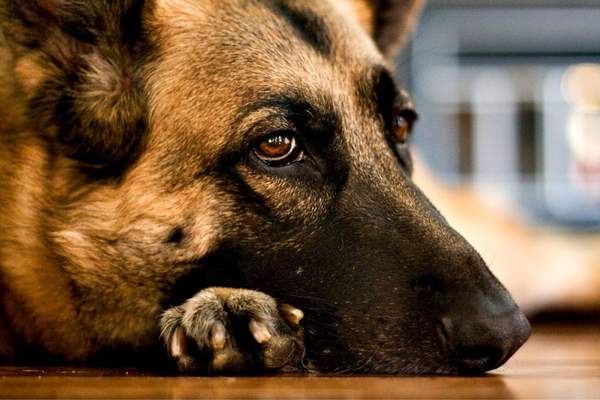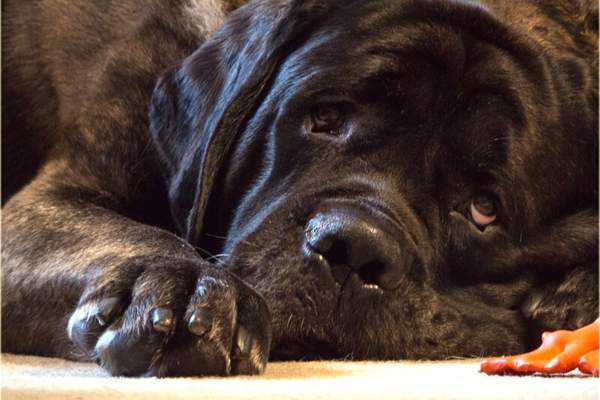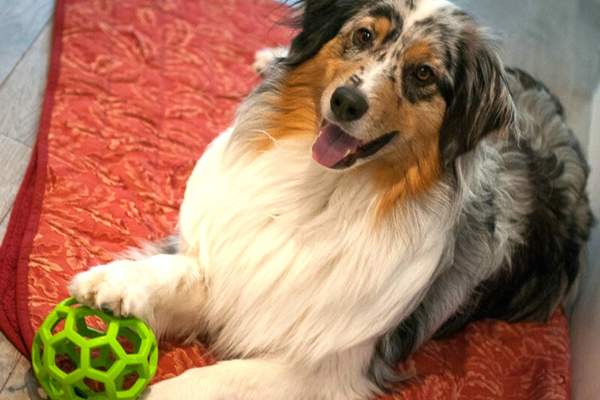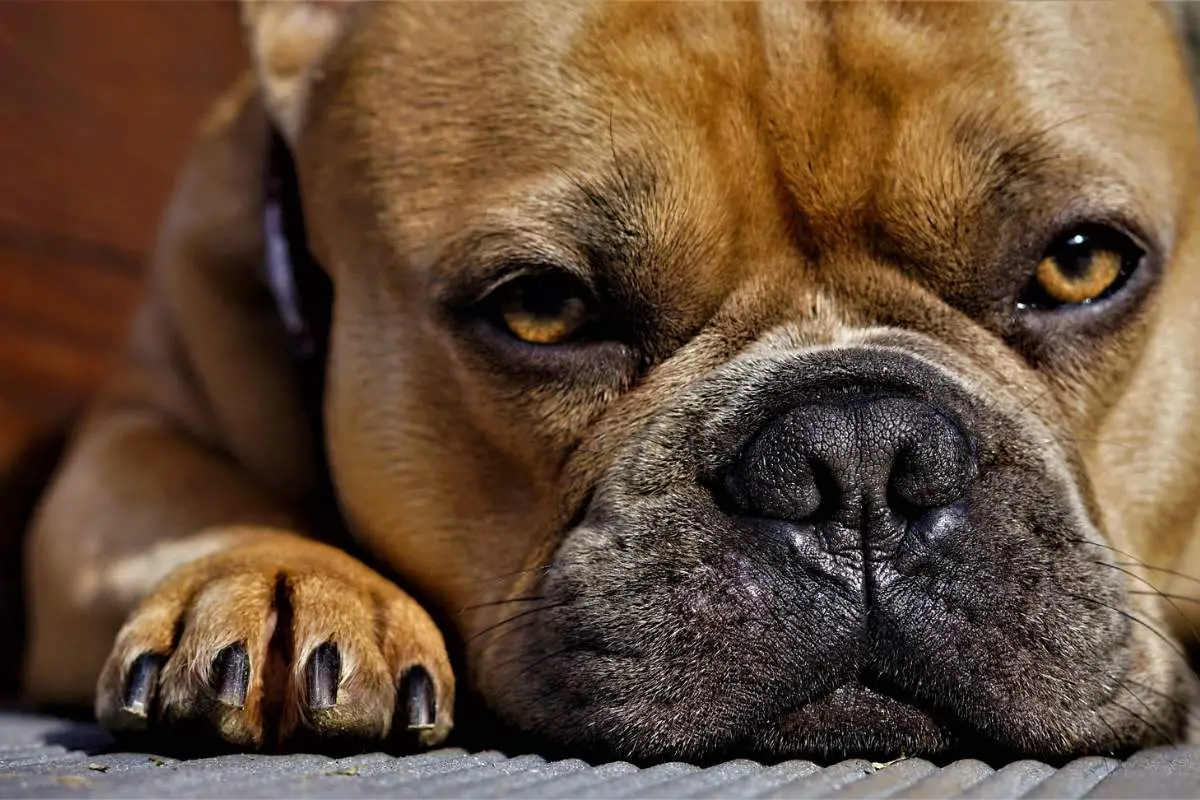Dogs are fascinating creatures that have captured the hearts of humans for thousands of years. They are loyal companions, protectors, and friends who are always by our side, wagging their tails and asking for belly rubs. But despite our close relationship with them, some of their behaviors still leave us scratching our heads.
One such behavior is when dogs put their paws on their face. We’ve all seen it: our furry friend sitting quietly, pawing at their nose or covering their eyes with their paws.
But what does it mean? Why do they do it? Well, there are several reasons for this behavior.
Why do dogs put their paws on their face?

1. To scratch an itch
Dogs may use their paws to scratch an itch on their face for various reasons. Allergies are a common cause, as pollen, dust, and other irritants can lead to itchy eyes, noses, and ears. Not only that, but dogs may also develop skin allergies or be exposed to environmental elements that aggravate their skin.
In addition, dogs may sometimes be dealing with an underlying medical issue such as eczema or mange that can cause them to scratch the same area of their face frequently. Whatever the case, it’s important to pay attention to this behavior and seek veterinary support, if necessary, to properly address any issues your pup may be having.
2. To show fear or anxiety
When a dog is fearful or anxious, it may use its paws to cover its face. This behavior is thought to come from a submissive or calming instinct that helps the dog protect itself in a situation it perceives as dangerous. However, this action is not always done for the purpose of hiding from the object of their fear but instead to communicate that they are in distress.
It can be helpful to observe your pet’s environment to try and identify what could be causing them to feel fearful. Additionally, if your dog frequently displays this behavior, it could be a sign of an underlying anxiety disorder.
3. To show submission
Dogs also cover their faces and noses to demonstrate submission toward their pack leader. This behavior is rooted in the animal world, where it is common for lower-ranking members of a pack to show respect or submission towards the top dog by displaying non-threatening behaviors.
These may include avoiding direct eye contact, body posturing, and even rolling over to expose their bellies. This is a way for the dog to show that they recognize you as the leader and are not looking for any sort of confrontation. If your pup does this, it’s likely because they trust you and want to assure you they don’t pose any threat.
4. They are trying to play or please you
Di you know that dogs have an amazing ability to detect and respond to our emotions? When they sense that their behavior makes us happy, they will likely repeat the action to bring us joy. For instance, when a dog or puppy covers its face with its paws, it could be doing so because they know it will elicit a positive reaction from you.
This is their way of making you smile and showing that they care. Dogs can connect with you emotionally, and communicating through body language like this is how they express themselves.
5. As a self-soothing behavior
Finally, dogs may put their paws on their face as a self-soothing behavior. Just like humans may touch their faces or hair when they’re feeling stressed, dogs may use their paws to self-soothe when they’re feeling anxious or overwhelmed. This behavior can be seen in puppies who suckle on their paws as a way of self-soothing.
Ways to Reduce or Prevent Pawing Their Face

What you should do ultimately depends on why your pup is pawing its face in the first place. Here are some tips to help get you started
1. For Allergies
If they have allergies as a result of things like pollen, dust, or other irritants, it’s important to keep your home and yard clean. Vacuum or mop regularly, and bathe your pup after being outdoors to help reduce the number of allergens they come into contact with.
Additionally, if you suspect food allergies may be contributing to the itching and pawing, consider switching up their diet. Speak with your vet about which foods are most suitable for your pup’s allergies. There are a lot of good hypoallergenic dog foods on the market these days.
2. For skin conditions or other health issues
As we have mentioned, there are certain medical conditions that can cause your pup to paw at its face. If you suspect this is the case, schedule a visit with your vet as soon as possible so they can diagnose and treat the underlying issue.
Additionally, they may recommend special shampoos and dietary supplements that can help soothe any irritation and reduce symptoms. It is important to avoid self-medicating or using over-the-counter products without consulting your vet, as this could make their condition worse.
3. For anxiety
If your pup is pawing its face out of fear or anxiety, try to identify and remove the source of its fear if possible. Additionally, you can help reduce their anxiety by providing a calming environment with plenty of outlets for exercise and mental stimulation.
Providing a safe space for them to retreat to and giving them lots of positive reinforcement when they display calm behavior can also help reduce their anxiety levels. There are also homeopathic remedies, like herbal supplements and calming treats, that can help reduce your pup’s stress levels.
4. When it’s just a habit or to please you

To help your pup break their habit of pawing their face, or if they do so simply to please you, redirecting their behavior is the best course of action. Ensure you reward your pup when they stop the behavior and offer them an alternative activity.
For example, if they start to paw their face, provide them with a toy or treat to distract them. Additionally, make sure that you are not unintentionally reinforcing this behavior by giving too much attention when they do it.
FAQs About Face Pawing
Is face pawing dangerous for my pup?
In some cases, yes. Pawing at their face excessively can lead to skin irritation and infection if left untreated. If the behavior is due to allergies or another medical issue, ignoring it can lead to more serious problems.
Therefore, it is important to observe your pup and take note of any changes in behavior, so you can get them the help they need.
Does constant face pawing mean my pup is in pain?
Not necessarily. While it can be a sign of discomfort and even pain, there are other potential causes that could also explain why your pup is pawing at its face. It is always best to observe them closely and take note of any other symptoms so you can figure out the root cause and treat it appropriately.
Is face pawing normal behavior?
In some cases, yes. For example, puppies may do this to explore or as a way to communicate with their owners. However, if the behavior is excessive or becomes a habit, it can indicate that something else is going on and should be addressed.
How can I stop my pup from pawing its face?
The best way to stop this behavior depends on the underlying cause. For example, if it is due to anxiety or a medical issue, then addressing that may help alleviate the problem. Additionally, providing plenty of positive reinforcement when they do not paw at their face and redirecting their
Can you use commands to stop your pup from pawing its face?
Yes, commands can be used to help redirect your pup’s behavior away from face pawing. Teach them to understand “stop” or “no” as a way to let them know when this behavior is inappropriate. Additionally, be sure to offer them positive reinforcement when they comply with the command.

